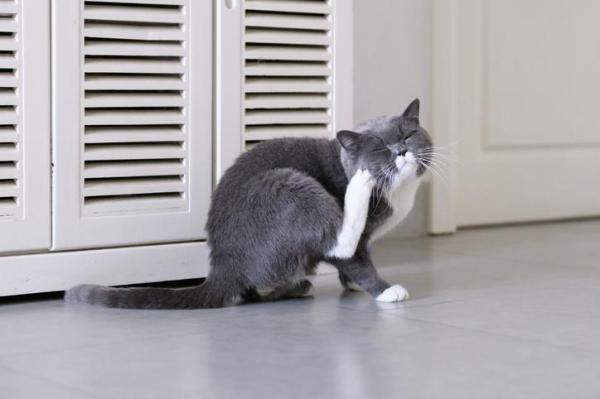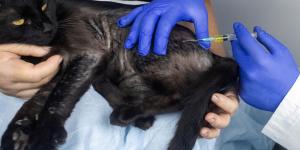My Cat Is Scratching Itself Raw



See files for Cats
A cat scratching itself is a normal and healthy behavior. If we had the dexterity of most cats, we'd be scratching just as much. As with any behavior, scratching excessively can cause serious harm. If a cat scratches itself raw, then wounds can develop which cause complications. Other reasons for a cat scratching or licking themselves compulsively can threaten their overall health. Some of these causes are not physiological in origin, but are due to emotional, environmental or behavioral problems. This makes determining the reason difficult.
In this AnimalWised article, we explain the possible reasons why my cat is scratching itself raw. This is not a replacement for a veterinary diagnosis, but it can help you know what to expect when your cat scratches too much.
Why a cat scratches themselves raw
The first thing we need to keep in mind is that when a cat itches, they are likely to lick themselves. Licking is also a normal behavior, but if your cat is overgrooming, then we need to pay attention. The cat's tongue is very rough which is useful when they need to get rid of tough dirt. When it is used excessively, it can cause damage to their skin and coat.
When a cat licks or scratches themselves too much, they can cause hair thinning, hair loss and even skin injury. This is what is meant by a cat scratching themselves raw. The extent of the damage shows the extent of the problem. Localized hair loss may mean one thing, but general skin damage means there is a serious issue.
Food allergy
Itching in cats can be due to various dermatological problems. However, this is not always the case. When the cat has an allergy or intolerance to food, one symptom which can manifest is inflammation to the skin. This leads to the cat scratching themselves raw when it is acute. Other additional symptoms will likely included gastrointestinal problems leading to vomiting and diarrhea. To treat the problem, we need to identify the food causing the reaction and remove it from their diet.
External parasites
We provide preventive medicine to our cats in the form of vaccinations and deworming treatment. The latter happens from the beginning of life because they are prone to parasitical infestation. The most widespread are fleas. They are blood sucking insects which bite to feed on the blood. This agitates the skin which makes the cat scratch.
With a severe flea infestation, the cat will keep scratching the skin until it is raw. There are many other external parasites in cats such as ticks which will lead to similar problems.
Additionally, some cats will have an allergic reaction to flea saliva or that of other parasites. In these cases, the bite itself triggers a reaction and causes the cat to itch severely. This can result in flea bite allergy dermatitis. Cats with this problem not only itch, but they develop lesions in the neck and lumbosacral areas. If you see your cat has raw skin in these areas, it could be this problem. After time your cat will have scabs which need attention from a veterinarian.
Fungal and yeast infections
Fungi, such as those which cause ringworm, do not usually cause itching at first. It is only over time once the infection has developed that the picture becomes more complicated. Ringworm is one which causes redness of the skin in particular. The cat will develop round lesions which are typical of the condition. The skin will often become red and flaky. Other fungal infections can cause this problem.
Yeast bacteria such as Malassezia can also lead to itching, as well as lesions, redness, peeling, scabs, bad odor and thickening of the skin. In these cases, injuries can appear anywhere on the body. It is necessary to see the veterinarian to identify the specific pathogens and prescribe the correct course of treatment. We cannot treat this on our own.
Eye problems
Does your cat scratch their face or eye a lot? It is a very common issue, especially with very young cats. Although problems mentioned above can lead to this issue, there are usually some specific issues which affect the head. When a cat keeps scratching their eyes, nose and ears, it can result in hair loss, but also risks damaging these sensitive areas.
If the cat scratches their eye a lot, it is possibly due to conjunctivitis which is one of the most common diseases in cats. In this case, you will see inflammation of the eyes and it may even start weeping. A foreign object will also cause similar problems and it is more likely to occur in the one eye. If the cat is unable to remove the object and/or the problem does not improve, you will need to take them to the vet.
Foreign bodies
Another sign of the presence a foreign body is when the cat scratches their nose a lot. In these cases, it is possible something has entered their nasal passage and won't come out. This often happens with pieces of plant material, but it can even be caused by dirt. They usually come out with sneezing, but if something is really stuck, we need to see a vet.
Otitis
If your cat scratches their ear raw, they may have an infection. In these cases, we may be able to smell a foul odor emanating form the ear. This is due to inflammation from the infection. The problem, is often further down in the ear canal, so we can't always see it at first. The cat scratching their ear a lot may be the first thing which draws our attention to the problem. If the skin becomes raw, it is very advanced. The cause of ear problems in cats is often from ear mites.
Other problems
In the minority of cases, it is possible the underlying problem is a more serious condition. These could be due to immune-related problems such as feline AIDS or, much less frequently, due to a tumor. With so many different causes of scratching their skin raw, we cannot diagnose the problem ourselves. Often the same symptoms will present for completely different causes. We need to go to a veterinarian to diagnose the problem and provide the right course of treatment. If we don't, we may make the problem worse.

What to do if my cat scratches itself raw?
Treatment for a cat scratching their skin raw will depend on the underlying cause. For example, if the problem is due to a food allergy, we need to determine the type of food. This may take a prolonged trial and error process, but a veterinarian may have some better diagnostic tests for some of the most common food allergies in cats. If these are not available or do not find any results, an elimination diet will likely be implemented, depending on the severity of the allergy. Once the food is identified, we can remove it from their diet permanently.
If the cat scratches a lot because they have a parasitical infestation, treatment involves administering the correct antiparasitic products for the specific parasite. These can be administered in tablet, solution, pipette and other preparations.
When something more serious such as an immune disease or cancer is leading to the scratching, we need to visit the specialist. They will provide the right diagnostic tests, set out the treatment program and, importantly, provide a prognosis. Ignoring these problems or self-medicating them can be fatal.
My cat scratches a lot but is healthy
If we see our cat is scratching or licking a lot, but there are no other visible symptoms, it is possible the issue is psychological. This is much less frequent, but it does happen. The veterinarian will usually be able to discern if the problem is psychological once physical possibilities have been ruled out.
What we see when a cat keeps scratching, especially when the skin becomes raw and they don't stop, might be due to compulsive grooming. This a response to stress. In these cases, there is no physical itching, but the anxiety from which the cat is suffering makes them feel like they need to do something. The result might be alopecia (hair loss) or even broken skin. The initial treatment will be for the skin damage. This may include antibiotics for cats to treat any secondary infection. After this, we will need to treat the psychological damage which may require the help of an ethologist.
Cats are animals which are very susceptible to change. Practically any change in their routine can trigger a serious stress problem. In these cases, they may develop constant scratching which eventually will cause skin damage if not stopped. Check out our article on reasons why your cat is stressed to learn more.

Home remedies for itching in cats
As we have seen, if a cat scratches itself raw it is necessary to go to the vet. We cannot diagnose the problem, nor are there any magic cures which will make them go away. When these are very serious underlying health problems, we will need to ensure a comprehensive treatment plan.
However, there are things we can do at home which will help prevent the problem of a cat scratching too much and making their skin raw. These include:
- Deworming: even when a cat does not have access to the outside, it is possible they will get parasites such as fleas. This is why a regular deworming schedule is so vital.
- Quality food: when a cat is denied proper nutrition, their general health will suffer. This can most often be seen in the deterioration of their coat. A proper diet of quality food will boost their immune system and help them to naturally fend of diseases which may cause them to scratch too much.
- Environmental enrichment: cats need a space in which they can carry out their daily activities. They also need to be cognitively stimulated regularly. If not, they can become stressed and may scratch themselves as a result. They will also need their cat impulses met. This means hunting, climbing high and scratching their claws. By providing accessories to help them do these things, we can help prevent problem behavior.
- Cat specific products: do not bathe the cat with products for humans and do not give human medication to cats.
- Veterinary checkups: compulsive licking and scratching will worsen over time. Ensuring we go to the veterinarian as soon as we see a sign of a problem is important. However, we should also take the cat for regular checkups to ensure their well-being.

This article is purely informative. AnimalWised does not have the authority to prescribe any veterinary treatment or create a diagnosis. We invite you to take your pet to the veterinarian if they are suffering from any condition or pain.
If you want to read similar articles to My Cat Is Scratching Itself Raw, we recommend you visit our Skin problems category.
- Bars, Juan. (2003). Veterinary Clinical Dermatology .







